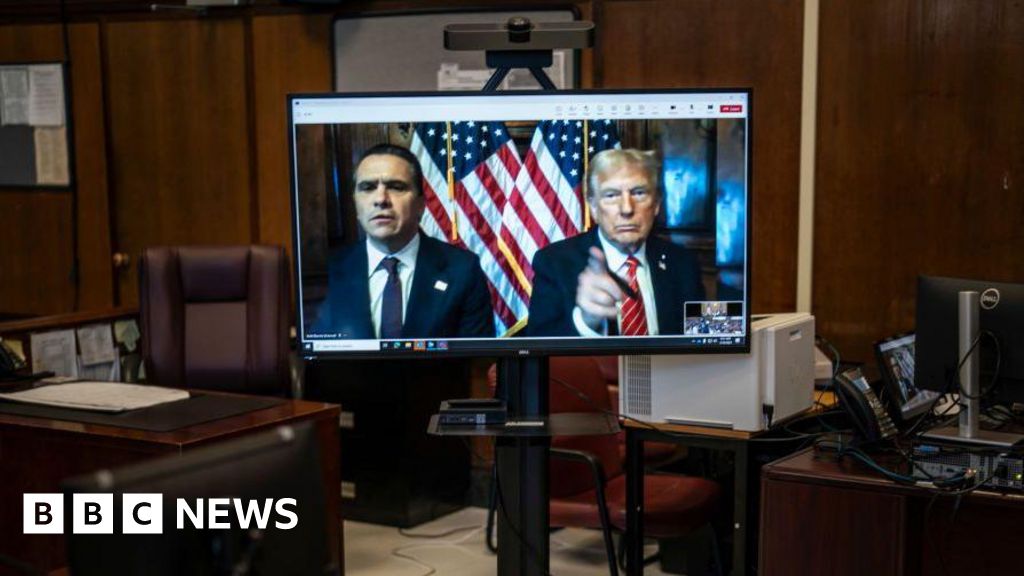ARTICLE AD BOX
By Alex Taylor
BBC Entertainment reporter
image sourceJasin Boland
image captionSimu Liu plays Shang-Chi, the first Asian superhero to lead a Marvel filmWhat do you expect from a Marvel blockbuster? Action, fantasy lands and flashy superpowers - certainly.
An Asian-American superhero exploring his cultural identity and confronting family ties in a fight to save the world? Probably not.
But that's exactly what Shang-Chi And The Legend Of The Ten Rings offers.
Directed by Destin Daniel Cretton, the 25th movie in the Marvel cinematic universe (MCU) breaks new ground by introducing Simu Liu as its first Asian superhero.
Liu says it "an incredible honour" to represent the community on the big screen.
His title role sees him play a martial arts master turned assassin who, following the death of his mother, grew up doing the bidding of his grief-stricken warlord father Wenwu - owner of the all-powerful Ten Rings.
Now estranged from his family, we first meet Shang-Chi attempting to reinvent himself in America by living as a valet driver named Shaun.
But this new life of parking cars (amid weeknight karaoke sessions with his co-worker and best friend Katy) is thrown into chaos when an ambush by his father's shadowy Ten Rings army reveals a plan that forces him to confront his past.
Discussing the role earlier this month Liu told reporters: "It's so rare that... people that look like me are thrust into those positions and I think it's tremendously empowering".
Cretton, born in Maui, Hawaii, similarly added: "I never had a superhero who I could identify with when I was a kid, and to be able to have an option for a new generation of kids who look like me or who have a similar background as me, that's very special."
The film's commitment to representation ensures a predominantly Asian cast alongside Liu that scales a spectrum of established and fresh faces.
image sourceDisney
image captionTony Leung, pictured as Shang-Chi's father the owner of the all-powerful Ten Rings, is among a number of established Asian stars in the filmLegendary Hong Kong actor Tony Leung offers heft as Shang-Chi's father intoxicated by the power of the Ten Rings, while Fala Chen plays his late mother Ying Li and Michelle Yeoh his aunt, both from the mystical land of Ta-Lo.
New names include Meng'er Zhang in her debut film role as Shang's embittered younger sister Xialing, with Ocean's 8 and Crazy Rich Asians star Awkwafina portraying Shaun/Shang-Chi's kooky friend and sidekick Katy.
Hollywood rises in the East
The diverse casting call reflects moves in Hollywood to capitalise on, and react to, film's growing culture shift to the East.
Crazy Rich Asians, based on a novel by Kevin Kwan, was the first US blockbuster with an all-Asian cast. It made just under £200m worldwide.
Fast behind it came the historic win for South Korean film Parasite, which was named best picture at the Oscars in 2020. This year, Korean-American film Minari, which follows a Korean family's attempts to forge their own American dream, capped multiple nominations at the Academy Awards with a best supporting actress victory for Yuh-Jung Youn - the first Korean actress to do so.
Discussing the changing face of Asian-American cinema in a roundtable interview with The New York Times, Minari's director Lee Isaac Chung said: "Initially what we saw of Asian-American films tended to be more exotic portrayals of Asians when you see them in Hollywood.
"Then I felt like there was a movement of just more pure identity cinema, a struggle to get our faces on the screen, to also explain ourselves in a way to a wide audience.
image sourceJosh Ethan Johnson
image captionChung has said a lot of the detail in Minari came from his own family background"What's happening now is that shift where we're just telling our stories as people and it doesn't have to be in relation to white America or a majority culture. We're just people. We didn't want Minari to be a 'by us, for us' sort of film. Because I felt like that was also something that we need to get beyond as well."
Shang-Chi is Marvel's attempt to mirror this three-dimensional cultural storytelling in blockbuster superhero stable - dragging the little-known "master of kung-fu", as described in the original 1970s comics, into the present day.
image sourceDisney
image captionDestin Daniel Cretton's identity-driven take on Shang-Chi resonates with LiuWhile the Ten Rings terrorist group has been an underlying element of the MCU since 2008, when it surfaced to kidnap Tony Stark in the first Iron Man film, this is the first time the backstory has been properly explored.
Producers Jonathan Schwartz and Kevin Feige (also president of Marvel Studios) say they consciously put power in the hands of those with lived experience to create the most authentic origin tale.
Cretton's personal vision of a superhero reconciling personal and family ties won them over.
Liu personally recognises the duality of his character he created: "I'm somebody who feels caught between two worlds a lot of the time," he told a gala earlier this month.
So just how is this reflected on screen?
The multilingual cast made language a powerful tool. "Speaking was always rooted in just the logic of the characters" says Cretton, who allowed the cast to converse in "whatever made sense for the scene", be it English or Chinese.
Liu points to one specific improvised scene where Awkwafina's character, Katy, discloses only being able to speak simplified "ABC" (American Born Chinese). "This is the first time that you really see in a [Hollywood] movie someone calling out a lived experience," says Liu.
image sourceDisney
image captionShang-Chi's fun-loving, sharp-tounged friendship with Katy offers a way to humorously address Asian-American identityKaty's playful on-screen chemistry with Shaun-turned-Shang-Chi is one of the film's highlights. The pair play off their cultural identities with humour and sensitivity. When she asks Shaun his Chinese name, he mocks her pronunciation of Shang-Chi. Their time working as valet drivers also sees Katy describe herself as "the Asian Geoff Gordon".
Beyond quips, Cretton suggests Shang-Chi's relatability as "a superhero that doesn't get splashed with chemicals to get his superpower" makes it easier for audiences to connect with the film's themes of identity.
"This is a journey of self-discovery, of growing up, of learning how to finally deal with pain that he's been running away from his entire life. And that when he is finally able to look inside into his past and embrace good, bad, the joy, the pain, and accept it all as a part of himself," he says.
If Shang-Chi attempts to refresh the Marvel character mould, so does Liu as its lead star.
The 32-year-old, who grew up in Canada and was previously best known for playing Jung in Kim's Convenience, admits he felt a "huge sense of imposter syndrome" stepping into the Marvel universe.
A former Deloitte worker, he switched to acting after being laid off. Not-so-glamourous past credits include an appearance as an extra on Guillermo del Toro's Pacific Rim and work as a stock photo model (much to the internet's amusement).
Liu has, unsurprisingly, described this latest role as a "dream" but also frequently emphasised the sense of responsibility he feels in helping to diversify Marvel's superheroes.
image sourceGetty Images
image captionLiu with co-stars Awkwafina, Meng'er Zhang and Fala ChenThis has included forcefully batting away any sense of novelty value - including from his bosses at Disney, who own Marvel.
The entertainment giant has released two other films with predominantly Asian casts - the live-action Mulan and the animated feature Raya and the Last Dragon - on their streaming service during the pandemic.
All of Disney's recent releases - like Jungle Cruise, Black Widow and Cruella - have been simultaneously released in theatres and on Disney Plus Premier Access, where subscribers pay an additional fee to watch a brand new release.
Shang-Chi, by contrast, is being given a traditional exclusive cinema release, despite audiences currently failing to return to pre-Covid levels in the UK.
Last month, Disney's CEO Bob Chapek said: "We think [Shang-Chi] is actually going to be an interesting experiment for us because it's got only a 45-day [theatrical] window... So the prospect of being able to take a Marvel title to the service after going theatrical for 45 days will be yet another data point to inform our actions going forward on our titles."
Liu seemed to respond to that comment when he posted on social media to forcefully state that Shang-Chi is "not an experiment."
"We are the underdog; the underestimated. We are the ceiling-breakers. We are the celebration of culture and joy that will persevere after an embattled year," Liu wrote. "We are the surprise. I'm fired... up to make history."
We are not an experiment.
We are the underdog; the underestimated. We are the ceiling-breakers. We are the celebration of culture and joy that will persevere after an embattled year.
We are the surprise.
I’m fired the f**k up to make history on September 3rd; JOIN US. pic.twitter.com/IcyFzh0KIb
The BBC is not responsible for the content of external sites.View original tweet on Twitter
A superhero rallying cry to celebrate Asian culture - both on screen and beyond. Shang-Chi's fight is more than fantasy.
Shang-Chi is released in cinemas on Friday.

 3 years ago
201
3 years ago
201








 English (US) ·
English (US) ·